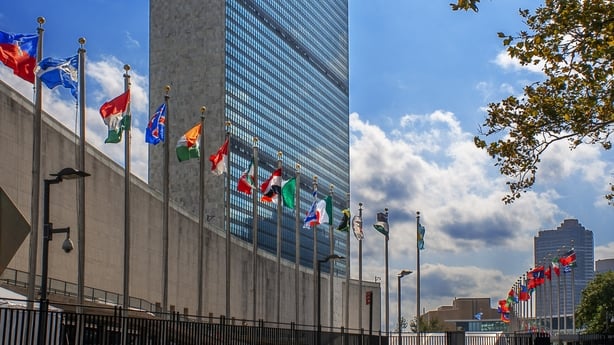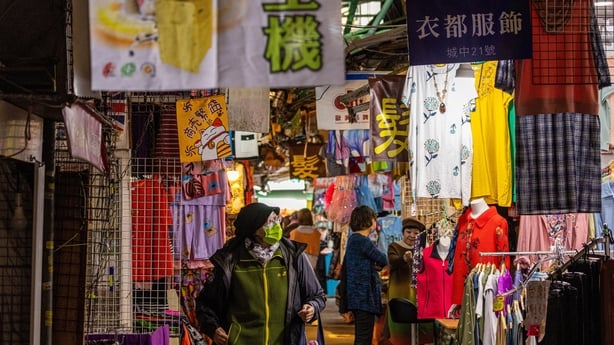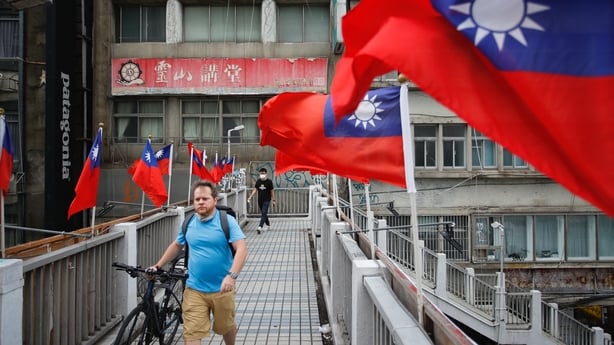The President of Taiwan, Tsai Ing-Wen, stopped in New York this week, on her way to South America.
But the United Nations headquarters is one place she won't be visiting.
Taiwan is one of the world’s biggest economies. Its computer-chip manufacturing dominates global supply chains. And its democracy is considered the most advanced in Asia.
But it is not a member of the United Nations.
It cannot take part in any UN events or conferences.
Taiwanese passport holders cannot even enter the building.
Asked why, by RTÉ News, the spokesperson for the Secretary-General, Stephane Dujarric, said that it was the policy that headquarters were only open "to people with identifications of Member States of the UN".
The spokesperson referred to a resolution passed in 1971, Resolution 2758, which stated that the People's Republic of China was the only legitimate government of China.
It kicked out the envoys of Chiang Kai-Shek, the leader of the then Nationalist government, which was based in Taipei, Taiwan's capital.
"The Secretary-General's position on China is guided by the relevant General Assembly resolution on the One China policy," he said.

But the UN has a problem.
Member states cannot agree on what the 50-year-old resolution means for Taiwan.
For China, the question is settled – their "One-China principle" is accepted by the international community.
"There is but one China in the world, Taiwan is an inalienable part of China’s territory, and the Government of the People’s Republic of China is the sole legal government representing the whole of China," China's Ministry of Foreign Affairs said in a recent statement.
"This has been clearly recognized by United Nations General Assembly Resolution 2758 of 1971."
But other member states – notably other powerful Security Council members, like the US – do not accept China’s interpretation, and define their own "one-China policy."
The United States recognises the People's Republic of China as the "sole legitimate government of China", a spokesperson for the United States UN mission told RTÉ News.
But they said that the US would continue to expand its cooperation with Taiwan on their "many shared interests and values" and would continue to support "Taiwan’s meaningful participation in the international community, and deepen our economic ties, consistent with our one China policy".
The spokesperson added that Beijing continues to "misuse" Resolution 2758 to block Taiwan’s "meaningful participation in international organizations".
"Resolution 2758 did not make a determination on the status of Taiwan and should not preclude Taiwan’s meaningful participation in the UN system," they said.

The Taiwan question remains a flashpoint in US-China relations.
President Tsai's stopover this week and the possibility she may meet House Speaker, Kevin McCarthy, next week drew a predictably angry response from Beijing.
"Those who play with fire will perish by it," the Chinese Embassy's Chargé d'Affaires Xu Xueyuan told reporters in Washington
The US supplies arms to Taiwan and maintains a policy of "strategic ambiguity" as to whether it would defend the island in the event of an invasion. China accuses the US of encouraging Taiwanese independence, which Washington rejects.
"Taiwan makes their own judgments about their independence. We are not encouraging their being independent. That's their decision," President Biden said last year.
But it is not pointedly their decision, according to Beijing, which has not ruled out taking Taiwan by force.
Inside the UN, China has worked to close down discussion of Taiwan in recent years, according to Bonnie Glaser, director of the Asia Program at the German Marshall Fund of the United States.
Beijing unilaterally decided that only Taiwanese who hold the "cross-Strait permit" that is issued by the People's Republic of China can enter UN buildings, she said.
"It is part of China's effort to isolate Taiwan and exclude it from the UN," she told RTÉ News.
A tally of member states, conducted by Carnegie Endowment for International Peace, showed that 51 of the 193 member states explicitly support China’s claim over Taiwan.

Some countries "acknowledge" China’s position, without expressing support, while others make no mention of Taiwan at all.
13 member states, meanwhile, maintain diplomatic ties with Taiwan.
But, Ms Glaser said, China has seen substantial success inside the UN in getting its own interpretation accepted.
"The UN remains firm in its commitment to the One-China principle, and will never deviate from it," the President of the General Assembly, Csaba Korosi, said on a trip to China last year, according to a press release from the Chinese Mission to the United Nations.
Asked for clarification by RTÉ News, his spokesperson said that the President was referring to the UN's policy, based on the 1971 resolution.
"It is really problematic that a UN official would say that the UN is committed to the One-China principle. It shows how successful Beijing's efforts have been to distort the meaning of UN Resolution 2758," said Bonnie Glaser.
Taiwan has made multiple attempts to participate in UN agencies as an observer, but has been rejected.
As China’s power within the UN system grows, there’s little chance the island democracy of 23 million people will be brought in from the cold.







